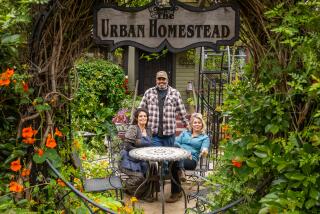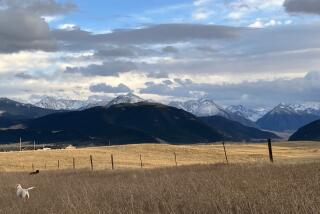Three Sisters Bring Woman’s Touch to Family’s Vermont Farm : Rural life: The hard work leaves little time for recreation or rest. But all are glad they returned to the tranquil site after years at other occupations.
- Share via
MUD CITY, Vt. — As a stewardess in the ‘50s, Jeannette Lepine chased adventure to the ends of the Earth. But she followed tranquillity home to a hillside, on a dot of land known as Mud City.
For Gertrude Lepine, a teacher, the walls of a one-room schoolhouse did a prison make. But she found freedom in the 16-hour workdays, the endless chores, the steady hum of life in Mud City.
Therese Lepine worked for a senator. For 25 years, Washington, D.C., was her address. It was never her home. Retired at last, she followed her heart--all the way back to Mud City.
Gertrude, Jeannette and Therese. With their mother, Imelda, they’re the brawn and brains, the heart and soul, of the 640-acre Lepine Farm, a Mud City landmark. Up at 4 a.m. seven days a week, 52 weeks a year, they milk 55 cows and coax 400 tons of hay out of land short on topsoil and long on stones.
Farm supply salesman Jeff L’Esperance has been stopping in at the green-shingled barn since 1984. “At first, I was very surprised. I kept looking around for the men.”
All three sisters are in their 60s; the scrambled hair beneath the battered work hats is mostly gray. No matter. “As long as your body keeps going, you don’t think about it much,” Jeannette said.
They’re all from the same slender, sinewy stock, with the same brown skin and huge knuckles, the same perpetual squint.
“It is a woman’s world here,” Jeannette said. You can see that in the black-eyed Susans on the table, the neatly labeled jars of homemade jam, the painting of Paris that hangs in the shed.
But it’s also a farmer’s world. These sleek Jerseys have one of the state’s highest production records, and the silo is full of the Lepines’ home-grown hay. Maple syrup is their other cash crop.
Like all good farmers, they’re part-time veterinarians, accountants, conservationists and mechanics. They are full-time survivors; in an age of foreclosures, they’re holding their own.
Because the Lepines prefer old-fashioned methods, their barn chores alone take nine hours a day. There are easier--and faster--ways than to milk four cows at a time into separate buckets. But “it’s the only way you can tell how much milk each cow is giving,” Gert said.
Twice a day, at 5 a.m. and 5 p.m., Gert works her way down one row of cows, Jeannette the other. “You know each individual udder. That’s why you each milk one side,” said Jeannette, who thinks women are more patient milkers, “not so apt to whack a cow if she kicks.”
The cows on Gert’s side have the better view. Each gazes out at a sliver of paradise: Whiteface, Madonna, Spruce, Mansfield, Elmore, Hunger. (Those are the mountains’ names, not the cows’.)
Ask about the farm and the Lepines tell you it’s long and narrow, with 150 acres of tillage and the rest mostly woods. True enough. But that says nothing of the rings of blue mountains that surround it, or the tangle of wild raspberries that line the dirt road like a barbed-wire fence.
It doesn’t tell you how quickly the barn goes from freezing to snug as it fills with cows on a cold winter’s night, or how gracefully the sisters pilot their wheelbarrows and tractors, working together with precision and speed.
Gert jokingly calls Jeannette “the lead cow,” but in fact Gert’s the boss and the farm is in her name. With no children to follow her, she plans to sell the development rights to a land trust to protect the property after she’s gone.
Jeannette rents out a nearby farm she owns and shares the green-shingled home place with Gert and Imelda. Therese has her own house three miles away, but spends most of her time at the farm.
The twice-daily milkings are bookends to the other chores: paper work, machine repair, haying and the myriad other tasks large and small that go into keeping the business afloat.
It’s a burden that rests on them lightly as they alternately squabble and joke, tossing 40-pound hay bales as though they were feather pillows, hoisting 50-pound milk pails like so many half-gallon cartons.
“You are so clumsy!”
“Show some respect! I’m the boss!”
“We fight all the time,” Jeannette said, though the bickering is usually short-lived. Growing up on a farm with only each other for playmates taught them the importance of getting along.
Scraps of a rural Vermont childhood get pieced together over the oatmeal, eggs, toast and berries that follow morning chores, one of few opportunities to catch all four Lepines sitting down:
“Never a book of our own.”
“No contact with the outside world.”
“We built dams on the river and fished with a safety pin.”
“We’d whittle baseballs from chunks of wood.”
“The hardest part was for us country kids to go to the village high school,” Gert said. “We were so shy and maladjusted. Until they started school, they were further isolated by speaking only French.
But they have no regrets.
“It’s the greatest sense of accomplishment to take land that was nothing but rubbish and open it up,” Jeannette said. “There’s a strength to being raised on the soil, when you picked every damn rock, when your back was good.”
That strength is their birthright. Imelda was a teacher in rural Quebec when Maurice Lepine whisked her off to Mud City, a 7,000-acre section of Morristown, bordering Stowe ski resort in northern Vermont. Imelda bore two sons, four daughters and most of the work, after pneumonia damaged Maurice’s heart. He died in 1957.
When his health failed, “she was in the barn, in the house, everywhere. That woman never slept,” Jeannette said. “Washing and ironing for six kids, canning 400 quarts of tomatoes and strawberries--she was a relentless worker.”
Lawrence Lepine, her youngest, worked on the farm for a time, then moved to California. He’s now back in Morristown, where he owns an apartment house. Andre, another brother, works with migrant farm workers’ children near Syracuse, N.Y. Marie, the oldest, owns a restaurant near Denver.
One day 15 years ago, Imelda finished her chores, then collapsed on the way to the house. As Jeannette remembers it, “The doctor took one look and said, ‘Get her to the hospital!’
“She was given blood transfusions. A kidney had shut down, a huge stone was blocking it, and she nearly died.”
That was in the morning. By afternoon, she was up making hospital beds.
That disdain for idleness has been passed along to her daughters; Jeannette is building a second sugarhouse, having spotted some indolent maple trees “sitting around doing nothing.”
At 92, Imelda still does the dishes, though she grudgingly relinquished the cooking. Therese squeezes it in between spreading hay and shoveling manure.
Today, Therese serves homemade vegetable soup and bread, sugar snap peas and wild raspberries, washed down with raw jersey milk that’s as cold and rich as melted ice cream.
Along with a brief respite from chores, meals provide a chance to socialize. Dropping in during dinner might seem rude in some circles, but it’s definitely de rigueur in Mud City.
One recent day the visitor was Jeannette’s tenant, Gayle Streeter, who brought 3-year-old Hannah and 4-month-old Faith. Hannah bore gifts: homemade thumb-print cookies and a fistful of wildflowers.
Other than neighborly visits, social life is one of the first casualties of farming. Sleep, travel and night life are others.
Gert had her last vacation--a few days of trout fishing in Maine--28 years ago. In 1965 she went to a movie. “I used to turn on ‘Dallas’ every three years or so, but nothing had ever changed.”
Lightning struck the antenna four years ago and Gert never bothered to fix it. Seldom finished in the barn before 9 p.m., she’s lucky to get through the newspaper before falling asleep at the kitchen table.
At 5 on the dot, she and Jeannette push back their chairs. Dinner is over; rural rush hour has begun.
The first cows arrive from the fields and plod purposefully to stanchions. As the trickle becomes a stream, then a flood, the crowd grows thick, the traffic patterns chaotic, a bovine Grand Central at the height of the rush.
Jeannette dashes around with a grain pail, luring each cow to her spot. It’s not so different from handing peanuts to passengers, she said; farming, like flying, is “a study of motion and time.”
In her 11 years as a Pan Am stewardess--the only one, she said proudly, who refused to put on a girdle--she roamed the world freely: Europe, South Africa, the Middle East.
“I hung my hat in New York City but I never became part of it. In 1952, New York City was a lot of people, a lot of cement, and a lot of cars. In some ways, it was wonderful.”
But it wasn’t Vermont.
In 1963, Jeannette put herself, literally, out to pasture.
Gertrude was already there.
She still remembers the balmy spring day 40 years ago that put an end to her 2 1/2-year teaching career. “It was during sugaring, and I knew they were tapping. The sap was running, and so was I.”
Farming has been her salvation. “You’re so free! That’s the problem. In most jobs, if you start singing, they lock you up.”
Therese was the last to come home, in 1975. Not that there was ever a question. In all her years as a secretary to former Vermont Sen. George Aiken (who also retired in 1975), “I was always a Vermonter. I always say I’m going to retire, but I never do.”
Nor do the others. And why would they?
Freedom, tranquillity, roots. On the rocky slopes of Mud City, in the dim cool of an old dairy barn, in timeless rhythms sure and steady as a heartbeat, the Lepines find they have everything.
Everything that matters.
More to Read
Sign up for Essential California
The most important California stories and recommendations in your inbox every morning.
You may occasionally receive promotional content from the Los Angeles Times.













